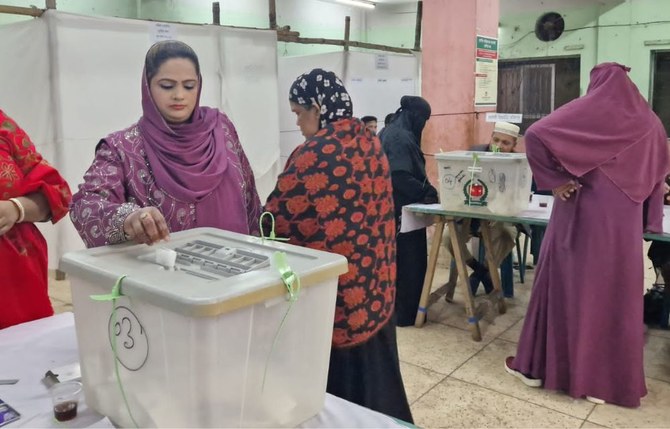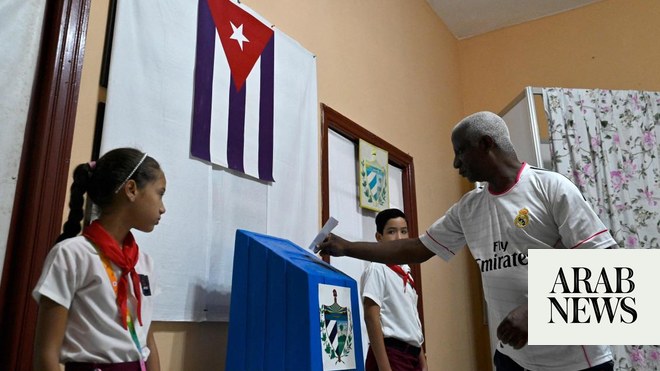
The poll has been shrouded in secrecy with a complete information blackout about the candidates and the political parties they represent
Out of the 598 wards in the valley, candidates in 244 have been declared the winners uncontested
NEW DELHI: Extremely low voter turnout, shut down, boycott and violence marked the first phase of the local body elections in Jammu and Kashmir on Monday.
Held after a span of 13 years, the poll has been shrouded in secrecy with a complete information blackout about the candidates and the political parties they represent.
The candidates are identified by a number and have not canvassed for votes for even a single day.
“The names of the candidates will be declared only after all the phases of the elections are over,” a Srinagar-based election commission officer told Arab News, requesting anonymity.
Contrary to the norm, the Election Commission has not given any data about the percentage of polls in the valley.
However, according to the data available by 3 p.m. local time, eight hours after the polling started, there were fewer than 6 percent voting in Srinagar’s 83 urban wards.
Out of the 598 wards in the valley, candidates in 244 have been declared the winners uncontested.
In 167 wards, not a single candidate came forward to file nomination.
Both the mainstream political parties, National Conference (NC) and People’s Democratic Party (PDP), are boycotting the elections, citing the attempt to dilute an exclusive citizenship act — Art. 35A — that is under challenge in the Supreme Court of India.
Article 35A gives the state legislative assembly rights to define who are permanent residents and also debars outsiders from buying land anywhere in Jammu and Kashmir.
There is a fear that if the Supreme Court abrogates Art. 35A, New Delhi might indulge in demographic alteration of the valley.
“You can see yourself what kind of election is happening in Kashmir,” said Ali Muhammad Sagar, a senior NC leader.
Talking to Arab News, Sagar stressed: “When the voter is not aware where the polling booth is, or who their candidate is, then you can understand the sham that is taking place in Kashmir in the name of democracy.”
“Have you ever heard or seen this kind of election taking place anywhere in the country? Can you give me an example like this?” Sagar asked.
He added: “We are not participating in the election because we feel that the Art. 35A, which is the core of Kashmir’s existence, is being tampered with by the central government. The government in Delhi, which should have defended the Art. 35A, is actually opposing it.”
Rafi Mir of the PDP said: “The timing of the election is wrong. How can you hold an election in an atmosphere of fear and violence?“
The ruling Bharatiya Janata Party (BJP), however, is upbeat about the elections. The Hindu party has won many seats uncontested and made its presence felt in the Muslim-dominated Kashmir valley for the first time in the past 70 years.
“We have won 84 municipal wards uncontested across Kashmir and will consolidate ourselves further in the coming days,” said Altaf Thakur, BJP spokesperson on Kashmir.
“Out of 84 seats, 80 are in South Kashmir, which is the hotbed of militancy,” Thakur said.
“The parties who are boycotting the elections are opposed to democracy; they just want to sustain their dynastic rule. That’s why they did not hold elections for 13 years.”
Arab News tried to talk to some of the candidates contesting the elections. While four of them refused to talk, one BJP candidate, Shazia, said: “There is no harm in participating in the elections. I also want to serve the people.”
“To say that people are not participating in the election is wrong. They don’t want to show up because of fear.”
Professor Sheikh Showkat Hussain of the Central University of Kashmir, however, sees this election as a “referendum against the government.
“The very fact that people refused to show up demonstrates the anger against the establishment in Delhi and Srinagar,” he said.
“Alienation of Kashmiris is deepening. The very fact that two mainstream parties, who are status quoists, are also boycotting the elections, shows how much people in the valley have got alienated from Delhi,” added Hussain, a scholar of human rights and international law.
The professor told Arab News: “The government thinks that by infusing money and military it can win the people of Kashmir. But they are wasting their resources and taking the people of India for a ride. Perhaps they want to show that everything is normal in Kashmir and they want to cash in in the next general elections.”
According to reports, New Delhi has sent 30,000 additional paramilitary personnel to the valley in addition to the 56,000 troops already stationed there. Besides, 100,000 Jammu and Kashmir police are also deployed in the region to maintain law and order.












